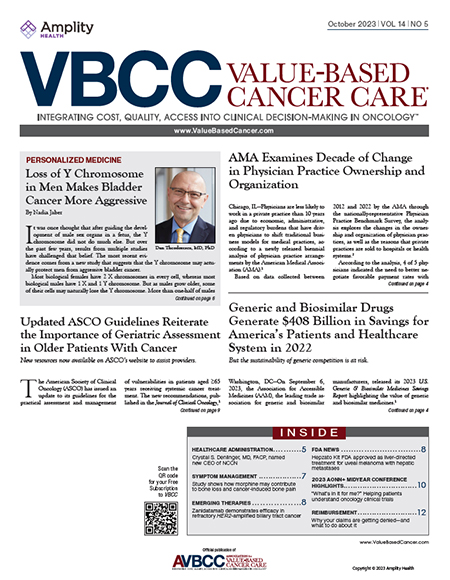Value-based contracting is the future of healthcare. However, because multiple stakeholders play a role in these contracts, complications often arise. In the December 1 session of the Association for Value-Based Cancer Care (AVBCC) 10th Annual Summit, a panel of experts discussed some of the obstacles in value-based contracting in pharmaceuticals and the opportunities for innovation.
Jonathan Levitt, Esq, Co-Founding Partner at Frier Levitt LLC, who moderated the session, emphasized the importance of the many stakeholders involved in value-based care, particularly in cancer care.
Lili Brillstein, MPH, Chief Executive Officer of BCollaborative, said that the success of a value-based model relies on the ability to collaborate among these stakeholders. The focus of value-based care is not rendered by one physician; it should be all comprehensive care provided to one patient. Ms Brillstein believes we need to shift from an incremental approach to focusing on outcomes and reducing variations in care and costs to better utilize resources and provide quality care.
Ira Klein, MD, MBA, FACP, Chief Medical Officer of Health New England, also sees the need for collaboration. In his experience, Dr Klein has seen much waste, duplication, and error in the medical system. Fee-for-service has allowed misaligned incentives, which hinders the ability to organizationally manage shared risks.
Roger Longman, Chairman and Founder of Real Endpoints, LLC, spoke on risk-sharing programs as they have become more prominent in the pharmaceutical industry. Oncology reimbursement was irrelevant to pharmaceuticals for many years, and certain payers have become stricter at what they are allowing in terms of utilization of oncology drugs. Mr Longman believes there needs to be an objective way to value pharmaceuticals.
Jesse Dresser, Esq, Frier Levitt LLC, who offered a legal perspective, discussed the Anti-Kickback Statute (AKS), which is against anything that could be seen as driving for referrals. In structural-based contracts, there is often a rebate that drives the use of a particular drug, which implicates AKS.
Gain access to these in-depth, expert views on the future of value-based analytics in oncology practices when you register for the AVBCC Summit!


